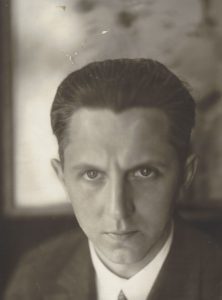
Erwin Piscator (1893 – 1966) was a thoroughbred theater man. He revolutionized the theater. For him, acting was not the art of beautiful appearances, not mere entertainment. The cruel experiences at the front in World War I had opened his eyes. From then on, he wanted to open people’s eyes through his theater: to the grievances in state and society, to injustice and corruption in the economic system, to the failures of the political and ecclesiastical elites.
In the Weimar Republic, his political theater was intended to shake up the audience, to encourage them to think for themselves and to reflect critically. His committed theater wanted to encourage citizens to change the circumstances. Inventively, he made use of all the possibilities of modern technology on stage: treadmills, multi-story play scaffolding, documentary and feature films, superimposed comics, exciting lighting and soundscapes. Much of what we take for granted in theater today was first tried out and established by Piscator.
Piscator was not only a director and artist with heart and soul, he was an exemplary human being in dark times: neither political persecution nor hardship could slow down the convinced Protestant in his passion for a relevant up-to-date theater and for a just and humane society. He fled to New York to escape the Nazis, founded the Dramatic Workshop there and trained a whole generation of famous actors, including Marlon Brando, Judith Malina and Harry Belafonte. Beset by McCarthy’s anti-Communist agitation, he returned to the young Federal Republic of Germany in 1951. In the 1960s, his world premieres – including Rolf Hochhuth’s The Deputy about the Pope’s silence on the Holocaust, and Peter Weiss’ The Investigation, about the Frankfurt Auschwitz trials – sparked social debates.
Piscator once said, “For lack of imagination, most people don’t even experience their own lives, let alone their world. Otherwise, the reading of a single newspaper page would have to suffice to throw humanity into turmoil. So stronger means are needed. One of these is the theater.”
Political theater in this sense serves as a wake-up call; it is a theater that questions our habits of thought, speech and judgment. It is a theater that denounces the manipulation that goes on around us; a theater that exposes the structural weaknesses of our man-made institutions and corporations. The issues of such political theater today are many: they range from social inequality and poverty, to racism and bigotry, to exploitation of our natural resources at a deadly rate and climate change. In the end, it all comes down to the pursuit of a single goal: the respect of each of us for our fellow human beings. Piscator summed this up beautifully when he symbolically received the keys to the Freie Volksbühne in Berlin in 1962: “Let us glorify man! Let us instill in him the holiest of all feelings: man’s reverence for man! That is what we strive for. Let that be our goal!”
